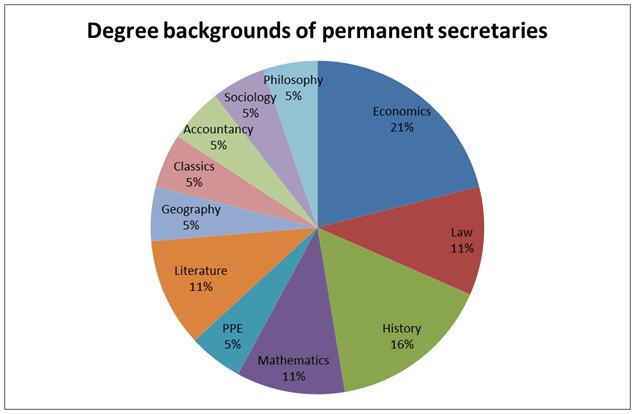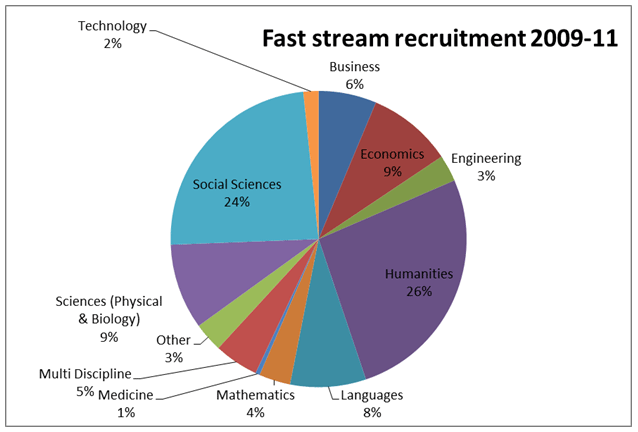Much has been made of Mrs Thatcher’s status as the first woman Prime Minister – and the fact that since her time, many more women have been elected to the House of Commons. But she was also the only scientist to be Prime Minister. And on that she remains very much the exception not the rule.
In the tributes to Mrs Thatcher, Lord Tebbit drew attention to the ‘two great influences in her life. One was her scientific training. The other, of course, was her religious belief’. Lord Waldegrave underlined the point with a story about how Mrs Thatcher used her scientific training not just to see off a proposal for regulation of the coal industry – but to intimidate her German counterpart, on a day when Bonn was suffering from a smog which could have been used to justify the policy change:
‘“Now Helmut”, she said to the cowering Chancellor – he was always a little nervous of her, as were others – “I will tell you what you have here. You have got an inversion and a smog. If you had proper clean air laws, like we do in England, that would have put paid to all that. I will explain the chemistry to you if you like.” He did not want to know the chemistry.’
And one reason why climate change has never been a left v right issue in the UK (compared to the US) was Mrs Thatcher’s very early embrace of the science in the late 1980s which convinced her of the case for action. Jon Agar has discussed at more length the importance of Mrs Thatcher’s science background. But while other women have seen Mrs Thatcher as a role model, even if they disagreed with her, scientists and people with science degrees have continued to shun politics and policy making. The statistics are quite striking. Not a single department is headed by a Cabinet member with a science or technical degree – the nearest they come is Dr Vince Cable – who did Part I Natural Sciences at Cambridge before switching to economics. PPE, Economics and History remain the dominant disciplines. The position among their permanent secretaries is little different. There are two mathematicians – and a bit more rigour in the economics. But again the top leadership remains a pretty science free zone. No one has entered government as a scientist and gone on to become a permanent secretary – while professional economists have established a recent lock on the top civil service jobs.  But those are people who started their careers – and had made their degree choices – at or before the start of the Thatcher era. What of the newest cohort, who were just being born when Mrs Thatcher fell from power? We looked at the academic backgrounds of those accepted into the civil service fast stream in the last three years. This is how they assessed their academic allegiance.
But those are people who started their careers – and had made their degree choices – at or before the start of the Thatcher era. What of the newest cohort, who were just being born when Mrs Thatcher fell from power? We looked at the academic backgrounds of those accepted into the civil service fast stream in the last three years. This is how they assessed their academic allegiance.  This does not show the whole picture. There is a small fast stream entry for science and engineering graduates used by three departments. And many people will join the Government Economic Service and then follow the path laid down by Lord O’Donnell and Sir Jeremy Heywood and cross over. But together it suggests that, twenty three years after the departure of our first scientist Prime Minister, and forty-five years after the Fulton report noted the marginalisation of science in Whitehall, there is an absence of scientifically literate leadership in government – and that that is unlikely to change very soon. That is the position the new Chief Scientific Adviser, Sir Mark Walport, inherits as he is charged with getting policy makers to understand the science underpinning their decisions. If anyone is going to ‘explain the chemistry’ today it will be Angela Merkel, with a PhD in Physical Chemistry, patronising David Cameron.
This does not show the whole picture. There is a small fast stream entry for science and engineering graduates used by three departments. And many people will join the Government Economic Service and then follow the path laid down by Lord O’Donnell and Sir Jeremy Heywood and cross over. But together it suggests that, twenty three years after the departure of our first scientist Prime Minister, and forty-five years after the Fulton report noted the marginalisation of science in Whitehall, there is an absence of scientifically literate leadership in government – and that that is unlikely to change very soon. That is the position the new Chief Scientific Adviser, Sir Mark Walport, inherits as he is charged with getting policy makers to understand the science underpinning their decisions. If anyone is going to ‘explain the chemistry’ today it will be Angela Merkel, with a PhD in Physical Chemistry, patronising David Cameron.
- Topic
- Ministers
- Keywords
- Climate change
- Public figures
- Margaret Thatcher Margaret Thatcher
- Publisher
- Institute for Government